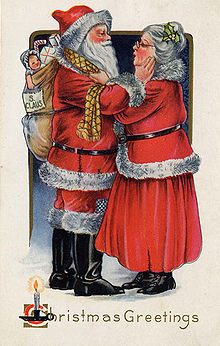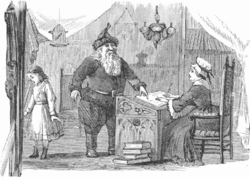Mrs. Claus
| Mrs. Claus | |
|---|---|
 Illustration from a 1919 postcard depicting Mrs. Claus (right) placing a scarf on Santa before his journey begins | |
| Associates | |
| Attire | Mrs. Claus suit, long petticoat, lace cap |
| Aliases | Mrs. Santa Claus, Mrs. Santa, Mother Christmas, Mrs. Christmas |
| Gender | Female |
| Occupation | Baker and reindeer herder |
| Spouse | Santa Claus |
| Home | |
Mrs. Claus, (also known as Mrs. Santa Claus, Mrs. Santa, Mother Christmas[1] or Mrs. Christmas) in British English, is the legendary wife of Santa Claus, the Christmas gift-bringer in Western Christmas tradition.
Origins
[edit]The wife of Santa Claus is first mentioned in the short story "A Christmas Legend" (1849), by James Rees, a Philadelphia-based Christian missionary.[2] In the story, an old man and woman, both carrying bundles on their backs, are given shelter in a home on Christmas Eve as weary travelers. The next morning, the children of the house find an abundance of gifts for them, and the couple is revealed to be not "old Santa Claus and his wife", but the hosts' long-lost elder daughter and her husband in disguise.
Mrs. Santa Claus is mentioned by name in the pages of the Yale Literary Magazine in 1851, where the student author (whose name is given only as "A. B.") writes of the appearance of Santa Claus at a Christmas party:
- [I]n bounded that jolly, fat and funny old elf, Santa Claus. His array was indescribably fantastic. He seemed to have done his best, and we should think, had Mrs. Santa Claus to help him.[3]
An account of a Christmas musicale at the State Lunatic Asylum in Utica, New York in 1854 included an appearance by Mrs. Santa Claus, with baby in arms, who danced to a holiday song.[4]
A passing reference to Mrs. Santa Claus was made in an essay in Harper's Magazine in 1862;[5] and in the comic novel The Metropolites (1864) by Robert St. Clar, she appears in a woman's dream, wearing "Hessian high boots, a dozen of short, red petticoats, an old, large, straw bonnet" and bringing the woman a wide selection of finery to wear.[6]

A woman who may or may not be Mrs. Santa Claus appeared in the children's book Lill in Santa Claus Land and Other Stories by Ellis Towne, Sophie May and Ella Farman, published in Boston in 1878. In the story, little Lill describes her imaginary visit to Santa's office (not in the Arctic, incidentally):
- "There was a lady sitting by a golden desk, writing in a large book, and Santa Claus was looking through a great telescope, and every once in a while he stopped and put his ear to a large speaking-tube.
- "Presently he said to the lady, 'Put down a good mark for Sarah Buttermilk. I see she is trying to conquer her quick temper.'
- "'Two bad ones for Isaac Clappertongue; he'll drive his mother to the insane asylum yet.'"
Later, Lill's sister Effie ponders the tale:
- Effie sank back in the chair to think. She wished Lill had found out how many black marks she had, and whether that lady was Mrs. Santa Claus – and had, in fact, obtained more accurate information about many things.
Much as in The Metropolites, Mrs. Santa Claus appears in a dream of the author Eugene C. Gardner in his article "A Hickory Back-Log" in Good Housekeeping magazine (1887), with an even more detailed description of her dress:
- She was dressed for traveling and for cold weather. Her hood was large and round and red but not smooth, – it was corrugated; that is to say, it consisted of a series of rolls nearly as large as my arm, passing over her head sidewise, growing smaller toward the back until they terminated in a big button that was embellished with a knot of green ribbon. Its general appearance was not unlike that of the familiar, pictorial beehive except that the rolls were not arranged spirally. The broad, white ruffle of her lace cap projected several inches beyond the front of the hood and waved back and forth like the single leaves of a great white poppy, as she nodded emphatically in her discourse.
- Her outer garment was a bright colored plaid worsted cloak reaching to within about six inches of the floor. Its size was most voluminous, but its fashion was extremely simple. It had a wide yoke across the shoulders, into which the broad plain breadths were gathered; and it was fastened at the throat by a huge ornamented brass hook and eye, from which hung a short chain of round twisted links. Her right arm protruded through a vertical slit at the side of the cloak and she held in her hand a sheet of paper covered with figures. The left arm on which she carried a large basket or bag – I couldn't tell which – was hidden by the ample folds of the garment. Her countenance was keen and nervous, but benignant.
Mrs. Claus proceeds to instruct the architect Gardner on the ideal modern kitchen, a plan of which he includes in the article.[7]

Santa Claus' wife made her most active appearance yet by Katharine Lee Bates in her poem "Goody Santa Claus on a Sleigh Ride" (1889).[8] "Goody" is short for "Goodwife", i.e., "Mrs."[9]
20th century
[edit]This section needs additional citations for verification. (December 2024) |
The character recurred throughout mass media of the time, with notable literary examples including the 1914 one-act play Mrs. Santa Claus, Militant by Bell Elliott Palmer, the 1923 story The Great Adventure of Mrs. Santa Claus by Sarah Addington illustrated by Gertrude Kay, and the 1963 children's book How Mrs. Santa Claus Saved Christmas by Phyllis McGinley.
In popular recordings, Nat King Cole released the 1953 song "Mrs. Santa Claus" with accompaniment by Nelson Riddle's orchestra,[10] while comedy duo Cheech and Chong had a hit with "Santa Claus and His Old Lady" in 1971.[11]
On television, Mrs. Claus was voiced by Shirley Booth in the 1974 stop-action animated special The Year Without a Santa Claus, and portrayed by Angela Lansbury as the protagonist of the 1996 live-action musical Mrs. Santa Claus.
21st century
[edit]Boost Mobile created some controversy with a 2009 ad featuring Mrs. Claus.[12] British company Marks & Spencer received positive attention for their 2016 marketing campaign based on a modern feminist interpretation of Mrs. Claus.[13][14] In 2018, there was an increasing demand for holiday appearances of Mrs. Claus as a standalone character separate from Santa Claus.[15]
In 2023, Sheryl Lee Ralph became the first celebrity and the first black woman to play Mrs. Claus in the history of the Macy's Thanksgiving Day Parade.[16]
See also
[edit]References
[edit]- ^ "The rise of Mother Christmas: why has Santa Claus suddenly been sidelined?". The Guardian. 2024-12-17. ISSN 0261-3077. Retrieved 2024-12-17.
- ^ James Rees, Mysteries of City Life, J. W. Moore, 1849, p. 1.
- ^ "Holiday Week", The Yale Literary Magazine, vol. 17, December 1851, p. 82.
- ^ "Santa Claus", The Opal, vol. 4, no. 1, 1854, p. 27.
- ^ "Editor's Easy Chair", Harper's, vol. 24, no. 141, February 1862, p. 411.
- ^ Robert St. Clar, The Metropolites, New York: American News Company, 1864, p. 37
- ^ E. C. Gardner, "A Hickory Back-Log", Good Housekeeping, vol. 4, no. 6, January 22, 1887, p. 125.
- ^ Penne L. Restad, Christmas in America: A History, Oxford University Press, 1996, p. 148. ISBN 978-0-19-510980-1. Although Restad gives the publication year as 1899, most sources say the poem was published in 1889.
- ^ "Goodwife" and "Goody", The American Heritage Dictionary of the English Language, 4th ed.
- ^ 01musicfan (21 December 2010). "Nat King Cole – Mrs. Santa Claus". Archived from the original on 2021-12-12. Retrieved 22 May 2017 – via YouTube.
{{cite web}}: CS1 maint: numeric names: authors list (link) - ^ "Cheech & Chong – Santa Claus and his Old Lady". YouTube. 27 August 2007. Archived from the original on 2021-12-12.
- ^ Wheaton, Ken (2009-12-01). "Mrs. Claus Gets Frigid in Naughty Boost Mobile Ad | Advertising and Marketing Wisdom: Adages – Advertising Age". Adage.com.
- ^ Metro.co.uk, Olivia Waring for (2016-11-11). "The 2016 M&S Christmas advert about Santa's wife totally sleighs John Lewis". Metro. Retrieved 2016-11-22.
- ^ "All hail Mrs Claus! How the M&S Christmas ad went fully feminist". The Telegraph. Archived from the original on 2022-01-12. Retrieved 2016-11-22.
- ^ Ellis, Rebecca (22 December 2018). "This Year, Mrs. Claus Is Coming To Town – And Not As Santa's Sidekick". NPR. Retrieved 25 December 2020.
- ^ Ray, Alyssa (November 23, 2023). "Fans Can't Get Enough of Sheryl Lee Ralph as Thanksgiving Parade's First Black Mrs. Claus". Parade.
Further reading
[edit]- Lill's Travels in Santa Claus Land, 1878, at Project Gutenberg
- Goody Santa Claus on a Sleigh-Ride, 1889, by Katherine Lee Bates, original edition and text.
